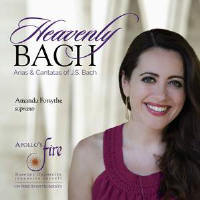Texte paru dans: / Appeared in: |
|
|
Outil de traduction |
|
|
Analyste: J. F. Weber
The coupling of this pair of solo cantatas for soprano was an early favorite, with Maria Stader under Karl Richter on Archiv, Agnes Giebel under Jaap Schröder in 1966, and Adele Stolte under Kurt Masur in 1971. (Since then BWV 202 has been more frequently paired with BWV 209.) BWV 51, Jauchzet Gott in allen Landen, one of the most frequently recorded of all the church cantatas, belongs to the 15th Sunday after Trinity, but can be performed at any time (as Bach put it). BWV 202, Weichet nur, betrübte Schatten, is a wedding cantata of unknown date and occasion, but certainly early, probably from Weimar. The main works are filled out by the two soprano arias from the St. John Passion. “Zerfliesse, mein Herze” is the lament on the death of our Savior toward the end of the Passion, while “Ich folge gleichfalls” occurs early in the work. While some trebles have recorded BWV 51 (Allan Bergius, for one), it has invariably been assigned to a female singer, even in the complete collections of the church cantatas with choirs of boys and men under Gustav Leonhardt and Pieter Jan Leusink. It is assumed that Bach had an exceptional treble soloist when he wrote it (probably in 1730). (Albert Schweitzer considered that the work makes its full effect with a clear treble voice.) The obbligato trumpet is used in the first and last movements to brilliant effect, culminating in a closing alleluia that is as long as the chorale that begins the movement. Amanda Forsythe is impressive in this performance, exceeding the level of her previous appearances (judging by the reviews of my colleagues). The wedding cantata is one of the most familiar secular cantatas. I reviewed a version by Edith Mathis (5:4) early on, comparing her to Suzanne Danco and Elly Ameling, among others. Mathis’s disc was one of a set of secular cantatas conducted by Peter Schreier. BWV 202 nicely complements the rousing Jauchzet Gott with a reflective opening aria. Debra Nagy plays a superb oboe obbligato, and the other instrumentalists are excellent. In the early days of Apollo’s Fire, I was not enamored with Sorrell’s efforts, but after three decades of experience she has grown in depth. These performances, recorded on three occasions several years apart, are excellent witnesses to the stature of the ensembles. The recorded sound is uniformly fine. Forsythe is the center of attention on this disc, and it showcases her considerable talent.
|
|




